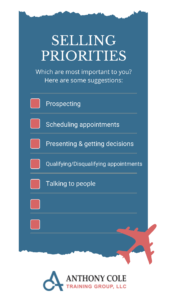When you are in an airplane, you may or may not pay much attention to what is going on in the cockpit. You may happen to glance at the massive control panel with all the switches, gauges, nobs and buttons, but it’s just a glance… before you hustle on to your seat to get settled in for the flight. But the pilot does, thankfully.
When you are getting ready to start your day, you may not pay a lot of attention to what is happening in the cockpit of your sales aircraft or to “the dashboard” that provides critical information about the state of your business. Normally, you jump in the pilot’s chair and fly off into your day. You have a pretty good idea of where you are going THAT day… so you probably don’t give much attention to the “preflight plans” for the rest of the week, month or quarter. If this doesn't apply to you, it may apply to some of your salespeople.
But, if you stop to think about your flight/business in longer terms, you know that, over the year, you will probably hit a lot of turbulence. And if used properly, your business dashboard, like the control panel of a 757, could provide you with the critical information that you will need to make the vital decisions required at those critical moments. In other words, it would be nice to have a system of alerts to give you warning BEFORE you are on the verge of crashing.
Have you looked at YOUR dashboard lately? Have your salespeople been checking theirs? What does it tell you? What alerts or warning systems do you have in place to let you know when you are losing altitude and attitude? How do you know if all systems are working properly and that your sales aircraft will get you safely to your destination – on time and on target? What should you be monitoring and doing every day (priorities) in your “preflight inspection” to make sure that you improve the probability of “getting there”? Think about these questions in regards to you and your salespeople.
Here’s my suggested short list of selling priorities: Prospecting, talking to people, scheduling appointments, conducting qualifying (and disqualifying) appointments, presenting and getting decisions. Just like for each engine of the aircraft, each of your priorities should have a gauge (a standard of performance) and a RPMS, or required ground speed (a set time frame), necessary for safely lifting-off and landing your aircraft at the proper destination.

Having a thoroughly monitored dashboard of sales priorities to help you execute a safe landing (your goal) is a MUST! Share this blog with your team to start the conversation about their own "dashboards."


